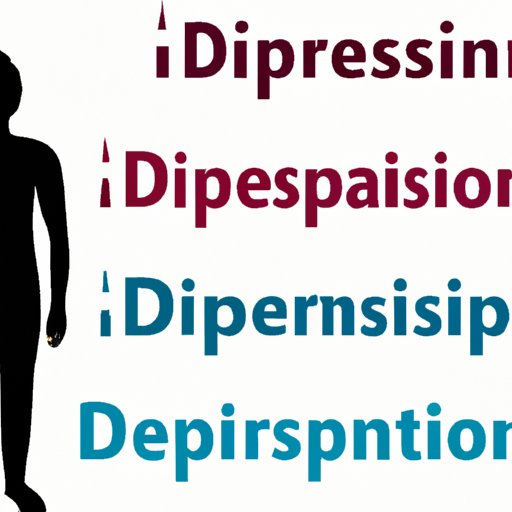Introduction
Depression is a common mental health disorder that affects millions of people around the world. It is characterized by persistent feelings of sadness, hopelessness, and a loss of interest in activities that you once enjoyed. Depression can make you feel as if you are trapped in a dark hole that you cannot escape.
If you are experiencing symptoms of depression, you are not alone. In fact, the World Health Organization estimates that over 264 million people worldwide have depression. Understanding the symptoms and signs of depression is an important step in getting help and feeling better.
Symptoms of Depression
Depression can manifest in many ways, and every person’s experience with depression is unique. However, there are some common symptoms that people with depression often experience:
- Feelings of sadness or hopelessness that last for weeks or months
- Changes in appetite and/or weight
- Difficulty sleeping, or sleeping too much
- Feeling tired or lacking energy
- Loss of interest in activities that you once enjoyed
- Difficulty with concentration or decision-making
- Thoughts of self-harm or suicide
It is important to note that experiencing one or more of these symptoms might indicate depression. However, it is also possible to experience depression without all of these symptoms.
It can be hard to accept that you might be experiencing depression. However, if you are feeling down or sad more days than not, it is worth paying attention to your feelings and considering seeking help.
Self-assessment quizzes
If you are unsure whether you are experiencing depression, there are several interactive self-assessment quizzes available online that can help you assess your symptoms. These quizzes use validated questionnaires to assess your symptoms of depression and anxiety.
Keep in mind that the results of a self-assessment quiz should not be the only factor in determining whether you have depression. However, they can be a helpful tool to gain insight into your emotional state and assess whether you should speak to a healthcare provider about your symptoms. Here are some self-assessment quizzes you can take:
- Psychology Today Depression Test
- Mental Health America Depression Screening
- Patient.info Depression Assessment Questionnaire
It is important to keep in mind that self-assessment quizzes are not a substitute for a professional diagnosis. If you are concerned that you may have depression, consult with a healthcare provider to discuss your symptoms and treatment options.
Real-life stories
Hearing from others who have experienced depression can be helpful in identifying your own symptoms and feelings. Below are a few real-life stories that might help you understand depression better:
Jane was a successful sales representative who had always been known for her positive attitude. Lately, she had been feeling very down and sad for no apparent reason. She didn’t enjoy socializing like she used to and was having trouble concentrating at work. Jane felt helpless and didn’t know what to do.
John had always been a happy-go-lucky guy, but after a traumatic event, he found himself struggling to get through the day. He didn’t feel like doing anything and found himself spending hours in bed even though he wasn’t sleeping. John felt hopeless and unsure of how to move forward.
By sharing these stories, it is easy to see how depression can impact every aspect of life. If you suspect that you or someone you love is experiencing depression, it is important to seek help.
The impact of depression
Depression can affect daily life, relationships, and work. In fact, depression is the leading cause of disability worldwide for people between the ages of 15 and 44, according to the World Health Organization. Here are some ways depression can impact your life:
- Difficulty functioning in daily life
- Strained relationships with friends and family
- Decreased work productivity
- Increased health risks
- Increased risk of self-harm or suicide
While these effects may seem overwhelming, it is important to remember that depression is treatable. With the right help, you can feel better and regain your sense of self.
The different types of depression
There are several different types of depression, each with unique symptoms and treatment options:
Major Depressive Disorder
Major depressive disorder is the most common type of depression. It is characterized by persistent feelings of sadness or a loss of interest in activities that you once enjoyed. These symptoms typically persist for at least two weeks and cause significant distress or impairment in daily life.
Persistent Depressive Disorder
Persistent depressive disorder, formerly known as dysthymia, is a milder form of depression that can last for years. Symptoms may be less severe than those of major depressive disorder, but they persist for an extended period of time, often two or more years. People with persistent depressive disorder may experience intermittent episodes of major depression.
Conclusion
If you suspect that you are experiencing depression, know that you are not alone. It is important to acknowledge your feelings and seek help if needed. Treatment is available, and with the right support, you can feel better.
If you or someone you know is struggling with depression, you can find more information and resources through organizations like the National Alliance on Mental Illness (NAMI) and the Depression and Bipolar Support Alliance (DBSA).
Remember, taking care of yourself is always a priority.
